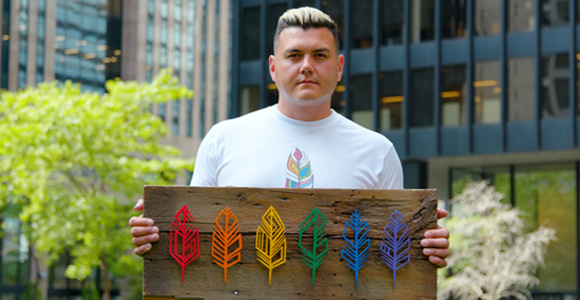Dec 28, 2022
How Yellow House Events pivoted after losing all its business in the pandemic
From an events company to a tech company in 5 weeks: Industry Insiders
“We lost all our business for 2020 within a two-and-a-half-week period,” recalls the 53-year-old founder and CEO of Yellow House Events in Toronto. “Even restaurants could continue with takeout, but it was pretty clear all in-person events were going to be cancelled.”
That included the luxe events and conferences that Yellow House had been putting on for such brands as Virgin, Maple Leaf Sports & Entertainment and Google for two decades. Instead of accepting defeat and temporarily closing shop, Yellow House began designing high-end virtual live events for clients, with innovative 3D venues that gave attendees a more authentic networking experience than the “Brady Bunch windows” Zoom or Teams could provide.
“Within the span of five weeks, we went from being an event company to being a tech company,” says Noble, referring to the timeline Yellow House had to put on its first virtual event – a conference for 500 people – in the spring of 2020. “Everyone had to completely relearn their jobs and teach the clients to do the same thing.”
That remarkable pivot opened up a whole new line of business for the company, allowing it to come through the pandemic successfully. But it wasn’t the first time Noble had to act fast to keep her business profitable in the face of change.
A STREAK OF STRATEGIC WINS
In the early 2000s, for example, BlackBerry was a major client, at one point comprising 80 per cent of Yellow House’s business. Concerned that left her vulnerable, Noble started courting other companies, which came in handy when BlackBerry’s fortunes started temporarily faltering. “After BlackBerry we became even more successful, which taught me to always be looking at the next opportunity,” she says.
Later, Yellow House made it through the "Great Recession" – a time when splashy events were among the first expenses to land on the corporate chopping block. To stay front-of-mind with clients, she gave them lucky money trees. “No matter if someone is superstitious or not, if you give them something called a lucky money tree, they’re going to keep it alive,” she says. “I remember Virgin in particular loved the lucky money tree.”
Motivating her through it all was a passion to create unique experiences and tell an organization’s story through live events – a skill Noble began cultivating at Western University, where she worked on charitable initiatives, including an annual fashion show that typically drew 1,000 attendees. Later, she worked on sponsorships and events for NBA Canada and Molson, and launched the event-marketing department for YTV.
DESTINED FOR BUSINESS OWNERSHIP
Noble says she was born to be an entrepreneur, even setting up her first “business” as an eight-year-old in South Africa, where she lived until her family immigrated to Canada in 1986. “I ran a tuck shop out of my bedroom,” she says, adding that her only customers were her parents. She started stocking snacks and other essentials once she realized her parents were willing to pay her a premium for items when they had friends over and ran out of supplies.
In 2002, she started her own events company, with a goal of creating a positive culture where she and others would want to work. “Most people start a business because they have a passion to do something and then build a culture around it,” says Noble. “But for me it was the other way around. I wanted to love where I went to work every day, and events was what I was good at.”
Unfortunately, as a woman who was younger than most of her (male) clients, Noble found she wasn’t always viewed as a business heavyweight. To lend her some gravitas, she bought a pair of glasses with clear lenses, despite having 20-20 vision. Surprisingly, it worked. “I saw a difference; I got taken more seriously,” she says.
All these years later, she mentors the young women on her team, counselling them about ways they too can be taken more seriously. For example, she advises them to avoid soft language such as “try” or “kinda” that can undermine their authority. “You either feed the dog or you kinda feed the dog; if you kinda feed the dog, you’ve got a dead dog,” she quips.
LOOKING TO THE FUTURE
Noble continues working hard to stay on top of the trends in her industry and stay relevant. Virtual events aren’t going away – and many in-person ones are going hybrid to increase accessibility. However, 80 per cent of Yellow House’s business is now corporate retreats, such as the wintery experience it gave one California-based client, with Ski-Doo-ing, fireside s'mores and dogsledding, along with refreshed company content and training. In-person events held at client offices have also increased, as businesses look for new ways to use the space they have and entice staff to return to the workplace.
“It’s really amazing to watch people connect in-person again,” says Noble. “We all have that need to get together, to be face-to-face and share an experience.”
And whatever comes her way, she’ll continue to pivot her way to success. “That’s what we do in live events – we’re always pivoting,” she says. “You have to have a Plan A, Plan B and Plan C – and they all have to be awesome because the chances you’re going to go with Plan A aren’t good. It’s all live and fast-paced. Anything can happen.”






